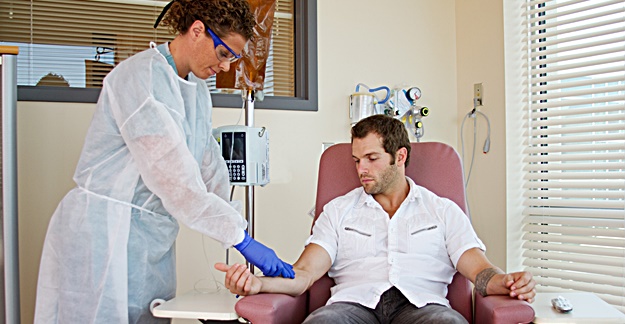Donna Fernandez didn’t know what to expect when she agreed to participate in an immunotherapy clinical trial.
“It never occurred to me that I might benefit,” said Fernandez, a Texas resident with Stage IV lung cancer that had progressed despite chemotherapy. “I thought I was going to help future generations.”
Fernandez was among the first people with lung cancer to receive Opdivo (nivolumab), an immunotherapy medication known as a biologic that helps the immune system “see” and attack cancer cells. At the time, the drug was not yet FDA-approved, and Fernandez was only expected to live a few more months. But shortly after beginning treatment, Fernandez’s tumors regressed. Four years later, her cancer is stable. And she says she is not experiencing any signs or symptoms of cancer.
“For me, immunotherapy has been a huge miracle,” said Fernandez, who has been taking Opdivo for 4 years. Yet she’s aware the immunotherapy is far from a cure-all: “I’ve got friends that it didn’t work for at all.”
In fact, only about 20% of people who are good candidates for immunotherapy benefit from the treatment. The impact of these drugs, though, is far greater than those numbers might suggest. Immunotherapy is giving hope to patients with cancers that were previously deemed incurable.
It is an option where none existed previously, and a new front in the battle against cancer. In 2016, immunotherapy drugs accounted for 4 of the 13 new anticancer treatments approved by the FDA, and the American Society of Clinical Oncology named cancer immunotherapy the 2016 Advance of the Year.
Current Uses of Immunotherapy
Immunotherapy is the use of medication to encourage the body’s immune system to attack and destroy cancer cells. Immunotherapy can be “targeted” or “general.” General immunotherapies, such as interferon-alfa (Intron, Pegintron) and interleukin-2 (IL-2, Proleukin), boost general immune activity. Targeted immunotherapies help the immune system recognize and target cancer cells. Cancer vaccines and so-called checkpoint inhibitors are forms of targeted immunotherapy.
Most of the recently approved immunotherapy drugs — including Opdivo, Keytruda (pembrolizumab), Tecentriq (atezolizumab), Bavencio (avelumab), Imfinzi (durvalumab) and Yervoy (ipilimumab) — are checkpoint inhibitors. Each of these drugs targets a specific chemical checkpoint — molecules on certain immune cells — then, when activated, unleashes the fury of the immune system against the cancer.
At present, the FDA has approved immunotherapy drugs to treat melanoma, lymphoma, non-small cell lung cancer, renal cell carcinoma, bladder cancer and certain head and neck cancers. Originally, these medications were only used to treat metastatic cancer or cancers that failed to respond to chemotherapy. But immunotherapy is rapidly becoming a first-line treatment, too.
Keytruda was FDA-approved as a first-line treatment for non-small cell lung cancer in October 2016 after a clinical trial showed that the drug decreased the risk of disease progression or death by 50%. And in April 2017, the FDA granted Tecentriq accelerated approval as a first-line treatment for certain patients with advanced or metastatic urothelial carcinoma.
Immunotherapy works by stimulating the body’s own immune system to recognize and target cancer cells, which usually results in fewer side effects compared to standard chemotherapy.
“Usually, you want to use your best, most effective treatment first,” said Eugene Ahn, MD, medical director of clinical research and a hematologist/oncologist at Midwestern Regional Medical Center in Zion, Ill. “Immunotherapies are really effective and also really well-tolerated, so there’s a lot of interest in moving them toward the front of the line.”
Unfortunately, there’s no way to tell whether a patient will be among the 5-20% who benefit from immunotherapy treatment or the larger majority of patients who do not. The presence of certain biomarkers — particular proteins on the surface of cancer cells — seems to increase the likelihood of a positive response. But while “the presence of a checkpoint marker plays a role, even people who don’t have those markers in their tumor have been observed to respond to these immunotherapies,” said Seth Pollack, MD, a researcher at the Fred Hutchinson Cancer Research Center in Seattle.
The presence of many mutations or a lot of inflammation within the tumor also seems to positively correspond to the likelihood of success with immunotherapy treatment. But right now, there’s no way to know — without trying immunotherapy — which patients will benefit and which will not. Researchers are actively studying this question, as well as ways (such as combining immunotherapy with chemotherapy or radiation) to increase the percentage of patients who see a positive response from immunotherapy.
What to Expect from Immunotherapy Treatment
Most immunotherapy medications are given intravenously every 2 or 3 weeks. Side effects are usually minimal, especially compared to chemotherapy.
“On chemo, I was extremely sick,” Fernandez said. “I was so nauseated I couldn’t make myself drink, and so fatigued that I could barely walk from the couch to the refrigerator.” On immunotherapy, she said, “I immediately felt fine. The only side effect I’ve experienced is that my thyroid quit working early on.”
Indeed, the increased activity of the immune system can cause endocrine dysfunction, which is why clinicians carefully monitor thyroid function during immunotherapy treatment. (Thyroid dysfunction is typically easily treated with oral thyroid hormone pills like Synthroid, also known as levothyroxine.)
Other possible side effects include a rash and diarrhea. These side effects usually are mild enough that they can be managed with over-the-counter medications. However, a small percentage of patients experience serious autoimmune toxicity.
“The immune system can attack the lungs; that’s called pneumonitis [inflammation of the lungs]. Or it can attack the endocrine organs, such as the thyroid or pancreas; a patient can develop pancreatitis or Type 1 diabetes. Colitis — inflammation of the colon — is another potentially very serious side effect,” Dr. Pollack said. “These toxicities are very, very rare, but they can wind up putting a person in the hospital. They can even be fatal.”
In Dec 2020, a study of Danish patient registries showed that checkpoint inhibitors were associated with heart damage in almost 10% of patients with lung cancer or melanoma.
Patients taking immunotherapy medication should report any abnormal symptoms to their doctor. Shortness of breath (a possible sign of pneumonitis) and diarrhea (a symptom of colitis) should be treated as medical emergencies, Dr. Ahn said.
If side effects are severe, immunotherapy treatment may need to be stopped. For other patients, the question of when to stop immunotherapy treatment isn’t so clear. If the medication isn’t affecting the cancer, quitting is an easy decision. But what if the cancer has regressed?
“There really is no standard of care on how long to do treatment,” Dr. Ahn said. “Usually, if a patient reaches the one-year point with no evidence of disease on their scans, we’ll ask if they want to take a break or keep on with immunotherapy. It’s really patient choice right now. I have several patients who are a year or two out from finishing immunotherapy and they still don’t have any evidence of disease.”







